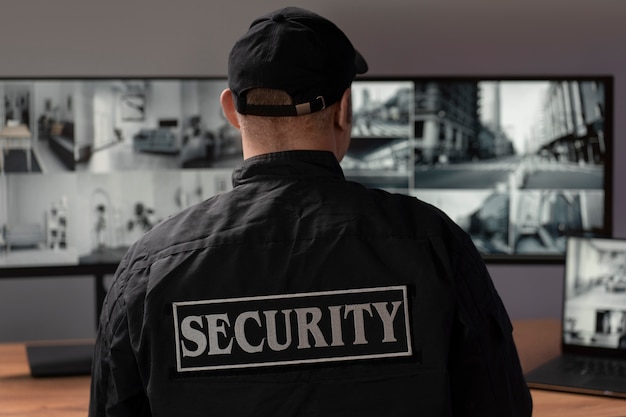Difference Between a Security Guard and Security Officer
In today’s world, security is a top priority for businesses, organizations, and individuals alike. However, there’s often confusion regarding the terms “security guard” and “security officer,” which are sometimes used interchangeably. While both roles are essential in safeguarding properties and people, they have distinct responsibilities, training requirements, and scopes of authority. Understanding these differences can help you make a more informed decision when choosing security services.
This blog will explore the difference between a security guard and a security officer, examining their duties, training, and the contexts in which they operate.
1. Defining the Roles: Security Guard vs. Security Officer
Both security guards and security officers play crucial roles in protecting assets, but their specific duties often vary. A security guard typically provides visible security presence and enforces basic safety protocols. In contrast, a security officer usually holds a more senior role, often tasked with planning and overseeing broader security operations, sometimes in a supervisory capacity.
- Security Guard: Responsible for routine patrols, monitoring access points, and reporting incidents.
- Security Officer: Often takes on managerial tasks, oversees teams of security guards, and implements strategic security measures.
2. Duties and Responsibilities
The difference between a security guard and a security officer is perhaps most evident in their day-to-day tasks.
- Security Guard Duties: A security guard’s main responsibility is to be a visible deterrent to potential threats. They monitor entrances and exits, verify identities, and perform basic patrols to ensure the area remains safe. If an incident occurs, a security guard’s role is to respond according to established protocols and notify law enforcement if necessary.
- Security Officer Duties: A security officer, on the other hand, may have more complex responsibilities. They often develop security plans, conduct risk assessments, and supervise a team of guards. Security officers coordinate responses during emergencies and may work directly with management to implement security policies.
3. Levels of Training and Certification
The training requirements for security guards and security officers also differ. Security officers generally undergo more advanced training to prepare them for their expanded responsibilities.
- Security Guard Training: Basic security training is usually required, including first aid, report writing, and observational skills. In some regions, guards may need licensing or certification, depending on the role’s nature and requirements.
- Security Officer Training: Security officers often need additional training in leadership, crisis management, and sometimes specialized skills such as cyber security or emergency response planning. They may also require higher-level certifications or licenses, especially when supervising other personnel or managing complex security systems.
4. Scope of Authority and Decision-Making
The decision-making authority differs significantly between a security guard and a security officer. While a security guard may follow a set protocol and report issues to supervisors, a security officer often has the discretion to make decisions based on real-time situations.
- Security Guards: They operate under specific instructions, often following guidelines on how to respond to various situations. Their authority is typically limited to monitoring and reporting without taking independent action unless instructed.
- Security Officers: Due to their more extensive training and experience, security officers are empowered to make more independent decisions. For example, if an emergency occurs, a security officer may initiate lockdown procedures, evacuate areas, or coordinate with external emergency services.
5. Work Environments and Specializations
Both security guards and security officers can be found in various industries, but the settings they work in may vary depending on their roles.
- Security Guards: Commonly employed in environments that require a constant presence, such as retail stores, construction sites, or parking lots. They provide basic security services and ensure the premises are safe for customers, employees, and assets.
- Security Officers: Often assigned to locations that demand a more strategic approach, such as corporate buildings, educational institutions, or government facilities. Security officers may oversee multiple locations and handle security systems, including CCTV monitoring and access control systems.
6. Salary and Career Advancement Opportunities
The difference between a security guard and a security officer also extends to their earning potential and career trajectory. Generally, security officers earn higher salaries due to their added responsibilities and experience requirements.
- Security Guards: Entry-level security guard positions may offer competitive wages, especially for those working in high-demand environments. With experience and training, guards can advance to more specialized roles.
- Security Officers: Since security officers manage teams and oversee larger operations, they often command higher salaries. Security officers with leadership and specialized skills may move into senior roles, such as security directors or facility managers.
Winnipeg’s Trusted Security Partner
As a leading security company in Winnipeg, Boss Security is dedicated to providing reliable protection across various sectors. From construction sites to retail and parking lot security, our tailored services ensure your unique needs are met. With experienced professionals and customized security plans, Boss Security stands as Winnipeg’s trusted choice for dependable, high-quality security services that prioritize safety and peace of mind.
Conclusion
In summary, while both security guards and security officers play vital roles in protecting people and assets, their responsibilities, training, and scope of authority distinguish them. Security guards focus on frontline tasks, offering a visible deterrent and enforcing safety protocols, while security officers bring a strategic approach, often supervising teams and managing security plans.
Understanding the difference between a security guard and a security officer is crucial when choosing the right security solution. At Boss Security, we provide both reliable security guards and highly skilled security officers to meet diverse needs, from construction site security to retail and parking lot security. Whether you need vigilant guards or experienced officers to oversee comprehensive security operations, we tailor our services to ensure your safety and peace of mind.














Post Comment